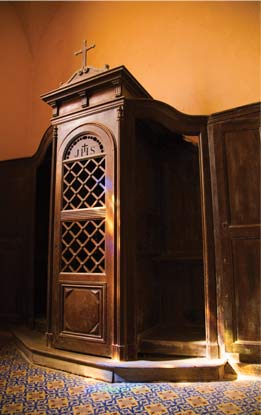Taken from the Brochure "Personal Encounter with Jesus Christ"

When to go to the Sacrament of Reconciliation?
A Catholic should definitely go to confession when aware of grave sin. In addition, the graces of the sacrament help us to overcome venial sins as well, so regular confession is very helpful. If too much time elapses between confessions, it becomes more difficult to remember what sins need to be confessed. Monthly confession seems to be a very good spiritual practice to help overcome the power of sin in our lives and to receive the healing mercy of Jesus Christ on a regular basis.
Prepare to Encounter Jesus Christ and His Mercy
To celebrate this sacrament well, we need to prepare ourselves well by examining our conscience effectively to know how we have sinned and where we need God’s mercy in our lives. Ask the help of the Holy Spirit and Our Lady’s intercession to see ourselves as we truly are.
What to Confess in Reconciliation
A thorough examination of conscience before confession is helpful for a fruitful experience. We need to confess both mortal and venial sins, in light of the Ten Commandments and the Beatitudes. We also need to confess both sins of commission and omission, the wrong things that we have done and the good that we have failed to do. Putting our sins into the context of our relationships with God, others and self is helpful. What have I done or not done that has damaged those relationships? Prayerful and thorough preparation helps us to receive the many graces of reconciliation.
Steps for Confession
1. Enter the confessional or Reconciliation room, make the sign of the cross with the priest, state your vocation in life, and say, “Bless me, Father, for I have sinned.” Tell him the last time you celebrated the sacrament of Reconciliation.
2. Confess your sins in a simple, straightforward manner.
3. Listen well to advice and to the penance the priest gives to do, as a sign of repentance and desire to overcome sin.
4. Pray an act of contrition.
O my God, I am heartily sorry for having offended you, and I detest all my sins because of your just punishment, but most of all because they offend you, my God, who are all good and deserving of all my love. I firmly resolve with the help of your grace to sin no more and to avoid the near occasion of sin. Amen. From the Rite of Penance.
5. The priest absolves your sins and you are forgiven through the power of the Holy Spirit.
6. Perform the penance prescribed by the priest.
Effects of a Good Confession
“reconciliation with God by which the penitent recovers grace; reconciliation with the Church; remission of the eternal punishment incurred by mortal sins; remission, at least in part, of temporal punishments resulting from sin; peace and serenity of conscience, and spiritual consolation; an increase of spiritual strength for the Christian battle.” (CCC 1496) “He is reconciled with his brethren whom he has in some way offended and wounded. He is reconciled with the Church. He is reconciled with all creation.” (CCC 1469)





